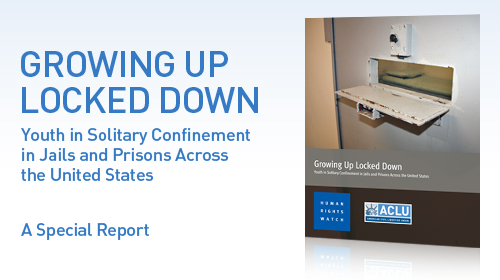
Last week the ACLU and Human Rights Watch released a report about the solitary confinement of young people in America’s jails and prisons. Kids in solitary often spend 22 to 24 hours a day alone, sometimes without access to books, let alone other people. The isolation can last for days, weeks, or even months at a time.
As the report explains, long-term solitary confinement can have devastating effects for anyone, but it is especially damaging to young people who rely on human interaction for healthy development and rehabilitation. The young people interviewed for the report described mounting fear and anxiety from being in solitary that often led them to cut themselves or attempt suicide.
Based on the findings of the report, the ACLU and HRW recommend that kids never be held in adult facilities, but when they are, they be held in separate areas with other kids, and never locked in solitary confinement.
This week, the New York Times called for states to ban or sharply minimize the solitary confinement of young people. As the Times points out:
Corrections officials have a duty to protect the public from crime. But they also have a responsibility not to permanently scar the lives of young people who are far from fully developed when they land in custody.
At the Washington Post, columnist Ruth Marcus writes:
This treatment is unconscionable and unconstitutional. Whatever you think about the use of solitary confinement when it comes to adults — and evidence suggests that it is both cruel and counterproductive — it cannot pass the minimum tests of decency to inflict this punishment on adolescents, with their still-developing brains, reduced capacity for impulse control and greater prospects for reform.
We know that the detention of adolescents poses certain challenges. They can be defiant, and sometimes try to hurt themselves and others. As the report notes, “Sometimes, facilities may need to use limited periods or forms of segregation and isolation to protect young people from other prisoners or themselves.” But alternatives like small group living, immediate and proportional interventions, and interactive treatment programs are more successful at preventing problem behaviors and addressing mental health problems in youth than isolation.
Using solitary confinement can harm children in profound ways. There should be no place in our society for a criminal justice system that leaves young people less equipped to live in society than when they entered.
Learn more about juvenile detention: Sign up for breaking news alerts, follow us on Twitter, and like us on Facebook.


